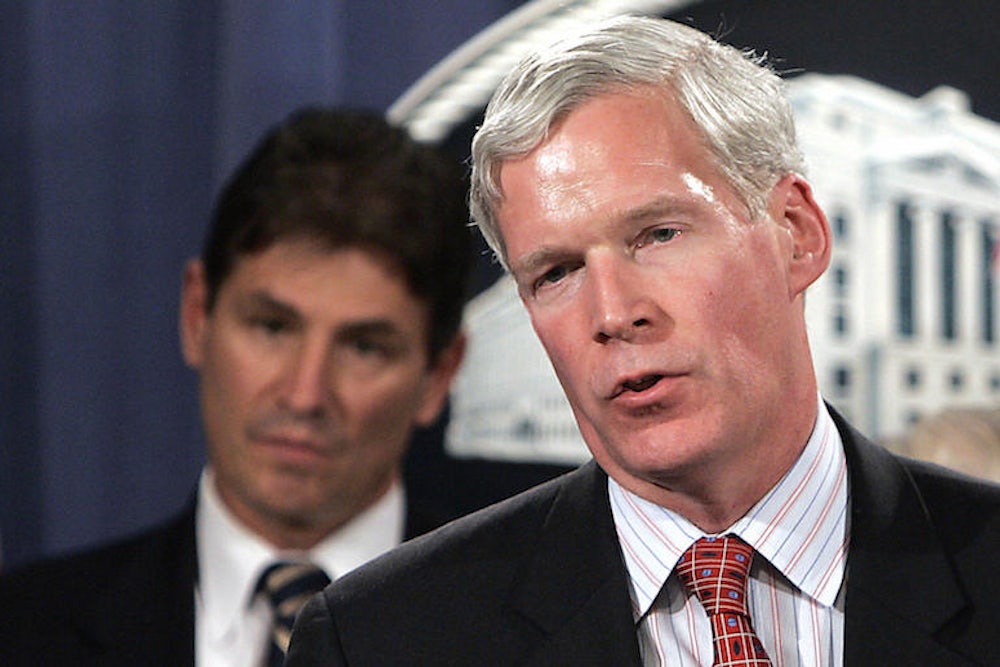On Monday, after Ted Cruz declared his candidacy for the 2016 presidential election, a man named Mark Everson fired off a statement calling the Texas senator the “standard bearer of government dysfunction” with a “silver tongue and a short senate career devoid of achievement.”
Cruz, it turns out, is the not the first Republican to announce his White House aspirations. He’s been beat by two others: In October, Jack Fellure filed for his eighth presidential campaign and declared the King James Bible, 1611 Edition as his platform. And on March 5, Everson sent in his paperwork, prompting only a little tongue-in-cheek press. “Mark Everson enters the 2016 race, because sometimes random people run for president,” wrote the Washington Post. A Forbes headline: “Former IRS Commissioner to Run for President. Yes, of the United States.”
And yet, on paper, Everson is far more broadly appealing than Cruz.
Everson, 60, currently the vice chairman of specialty tax service company Alliantgroup, was the Internal Revenue Service commissioner under President George W. Bush. He wants to reform the tax code based off Columbia law professor Michael Graetz’s Competitive Tax Plan, which imposes a value-added tax and removes the income tax for families making under $100,000. Cruz’s crusade to abolish the IRS is “just happy talk,” Everson told me. “You can’t abolish the IRS. You can make it smaller. I presume that Mr. Cruz wants to maintain social security and defense, so where’s he going to get the money?”
The rest of his platform is distinctly centrist. A former CEO of the American Red Cross, Everson proposes not to repeal the Affordable Care Act, but to broadly modify it. He opposes the death penalty, and on gay marriage he writes that “love overcomes some pretty high hurdles.” Perhaps most radically, he calls for undocumented immigrants to be granted amnesty—“to call it anything else is disingenuous,” he told me—and a path to citizenship. Everson describes himself as center-right, telling me that “center-left folks are willing to entertain solutions that are center-right if they feel they are well thought out and put forth for reasons that aren’t political or partisan.”
Everson does cater to the conservative crowd. Undocumented immigrants must be given rights and integrated into American society, he argues, “lest we follow Europe into incoherence, chaos and grave division over how best to contain the dangers of radical Islamist ideology.” He also calls for rebuilding the Navy and reinstituting a national draft (though his reasoning borders on liberalism: it would create “a stronger link between rich and mainstream Americans”). And in an implicit dig at President Barack Obama’s executive action that protected millions of immigrants from deportation, he told me the first thing he would do in office is “give clear instruction to follow the law as it is written—not as we would like it to be.”
Even though Everson’s platform would appeal to more general-election voters than Cruz’s, he is running a doomed campaign. So far, he’s raised “in the thousands of dollars,” and he’s bankrolling the campaign with only $250-300,000 of his own savings. And his campaign lacks a certain polish. In his fifteen-page “Letter to America,” Everson awkwardly mixes in his personal experiences. “Like many Americans, my youngest child’s mother and I were not married when he was born,” he writes. That’s because his youngest child was the result of an extramarital affair with a Red Cross employee, he blithely explains. He lost his job and marriage, but “learned a great deal through [his] own passage.”
Soon enough, Everson’s campaign will fizzle from a lack of airtime and donations. But until then, the current roster of Republican presidential candidates includes only one candidate who might deserve to be taken seriously—and it isn’t Ted Cruz.
